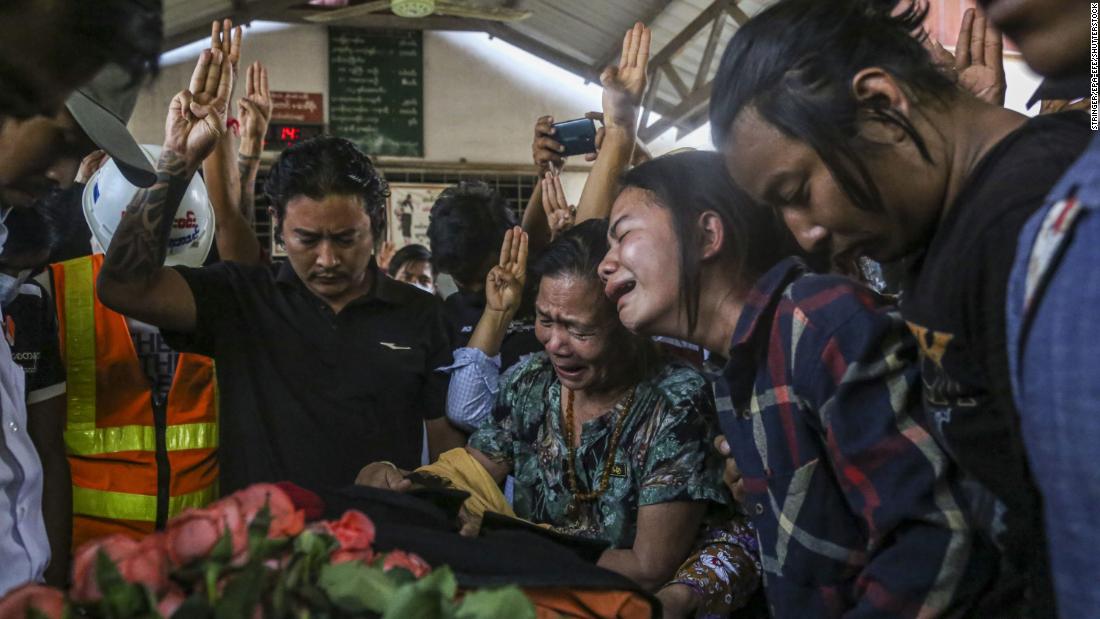In an unverified image, a protester can be seen huddled under an improvised shield while holding the shirt of another fallen protester.
At least 16 people were killed in other regions of the country on Sunday, including in the second city of Mandalay and in Bago, where state media said a police officer died of a chest wound after a confrontation with protesters, Reuters reported. This is the second police officer killed in the protests.
Weekend fatalities bring the death toll since the coup to at least 126 people, according to the AAPP.
The Chinese embassy in Myanmar said several Chinese-funded factories were destroyed and set on fire in Yangon’s industrial zone during Sunday’s protests. Chinese citizens were also injured, according to the embassy
It is not clear who the perpetrators were and no group claimed responsibility for the fires.
“China urges Myanmar to take more effective measures to prevent all acts of violence, to punish perpetrators according to the law and to guarantee the safety of the life and property of Chinese companies and officials in Myanmar,” quoted the statement by CGTN. embassy.
Anti-coup protesters are suspicious of China, with frequent demonstrations targeting the Chinese embassy in Yangon and protesters accusing Beijing of supporting the coup and the junta.
Although China did not openly condemn the military takeover, it supported a statement by the United Nations Security Council saying it “strongly condemns violence against peaceful protesters” and urged the military to “exercise maximum restraint”.
In its statement on Sunday, China asked protesters in Myanmar to express their demands legally and not to undermine bilateral ties with China.
After the bloodshed, the military junta imposed martial law in Hlaingthaya, one of the city’s largest districts where many poor factory workers live, according to state news channel MRTV. Local media reported that martial law was also declared in Yangon’s Shwepyithar district. On Monday, the military declared martial law in four more Yangon districts of North Dagon, North Okkalapa, South Dagon and Dagon Seikkan – areas where most of the city’s factories are located.
Martial law under the junta regime means that the military commander of the Yangon region receives “full administrative and judicial authority” in the districts where martial law is declared, according to local media Myanmar Now.
Mobile networks remained “deactivated across the country”, despite the restoration of Internet connectivity on Monday, after a shutdown for the 29th consecutive night, according to the NetBlocks internet monitoring service. Protesters and journalists have relied on their cell phones to broadcast live demonstrations and document police crackdowns.
‘People have the right to defend themselves’
As the protests continue in Myanmar, the leader of a group of lawmakers dismissed by the military promises to make a “revolution” to overthrow the ruling junta.
Speaking publicly for the first time on Saturday, Mahn Win Khaing Than, who was president of the upper house of parliament before the coup, said in a video address on Facebook: “This is the darkest moment in the nation and the moment when dawn closes . “
“To form a federal democracy, which all ethnic brothers, who have suffered various types of oppression from the dictatorship for decades, really wanted, this revolution is the chance for us to join our efforts”, Mahn Win Khaing Than, who is an ethnic Karen , said.
He also said that the civilian government “will try to legislate the laws necessary for people to have the right to defend themselves” against military repression, Reuters reported.
The military considers CRPH to be illegal and has warned that anyone found cooperating with them will be charged with treason. CRPH has declared Myanmar’s military a “terrorist organization”, according to Reuters.
On Sunday, the UN Secretary General’s special envoy in Myanmar, Christine Schraner Burgener, released a statement condemning the “continued bloodshed in the country, as the military defies international appeals, including from the Security Council, in moderation. , dialogue and full respect for human rights and fundamental freedoms. “
“The Special Envoy heard personally from contacts in Myanmar moving reports of murders, mistreatment of protesters and torture of prisoners over the weekend,” she said.
Why is Myanmar protesting?
The now reformed electoral commission denied that there was any evidence of mass electoral fraud.
It was only the second democratic vote since the previous military junta initiated a series of reforms in 2011, after half a century of brutal military rule that plunged Myanmar, then known as Burma, into poverty and isolationism.
Despite the danger, thousands of young protesters continued to challenge the military. The demonstrations are dominated by young people who have grown up with a level of democracy and political and economic freedoms that their parents or grandparents did not have and say they are fighting for the future.
CNN’s Hira Humayun and Richard Roth contributed reports.
